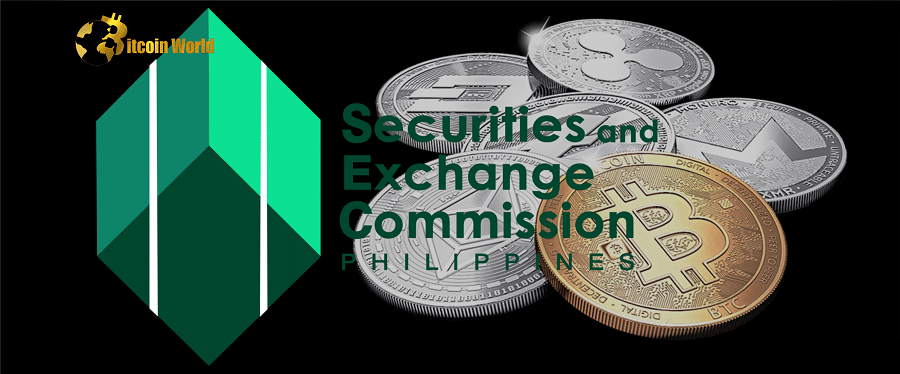The world of cryptocurrency in the Philippines is buzzing with activity, and regulators are taking note. The Philippine Securities and Exchange Commission (SEC) is considering strengthening its grip on the burgeoning crypto industry. If you’re involved in crypto in the Philippines, or just keeping an eye on global crypto trends, this is important news. Let’s break down what’s happening and what it could mean for you.
Why is the Philippine SEC Tightening Crypto Regulations?
In a nutshell, the SEC wants to bring cryptocurrencies and related businesses more firmly under its umbrella. They’ve drafted new guidelines aimed at expanding their authority over the crypto space. This isn’t entirely new; the SEC has been keeping a close watch on digital assets, but these proposed changes signal a significant step towards more formal and robust regulation.
Think of it like this: as crypto and blockchain tech become more mainstream, regulators worldwide are grappling with how to ensure investor protection and market stability. The Philippines is no exception. The SEC’s move is about adapting to this evolving landscape and ensuring that the rules keep pace with innovation.
What are the Key Proposed Changes?
The draft guidelines submitted by the SEC are quite comprehensive. Here are some of the key highlights:
- Expanding Jurisdiction: The SEC is looking to officially include cryptocurrencies within its regulatory purview. This means crypto assets will be treated more explicitly as securities under their jurisdiction.
- Broader Definition of Securities: The definition of “security” is set to expand. It will specifically encompass “tokenized securities products” and other financial products leveraging blockchain or distributed ledger technology (DLT). This is crucial because it clarifies that many crypto offerings could fall under securities regulations.
- Oversight of Digital Financial Products: Beyond just cryptocurrencies, the SEC wants to oversee a wider range of digital financial products and services offered through digital channels. This is a broad stroke, potentially covering various fintech innovations in the Philippines.
- Enhanced Enforcement Powers: The SEC is seeking greater power to enforce securities laws. This includes the ability to:
- Cap Fees and Charges: Prevent service providers from imposing excessive interest rates, fees, or other charges. This is a consumer protection measure.
- Disciplinary Actions: Reject or remove directors, executives, or employees who violate regulations. This increases accountability within crypto businesses.
- Business Suspension: Potentially suspend the operations of an entire company if there are serious regulatory breaches. This is a significant enforcement tool.
- Rule-Making Authority: Philippine laws already allow the SEC to create its own rules to enforce legislation. These proposed regulations are part of operationalizing this authority in the context of crypto and digital finance.
Why is This Happening Now?
Several factors are likely driving this push for tighter crypto regulation:
- Recent Legislation: The SEC states these regulations are designed to “operationalize a recently enacted bill.” This suggests new legislation has provided the framework for expanded regulatory powers.
- Investor Protection Concerns: Like many regulators globally, the SEC is concerned about protecting investors from scams, fraud, and excessive risk in the often-volatile crypto market.
- Market Monitoring and Stability: As the crypto market grows, ensuring its stability and preventing illicit activities becomes more critical. Enhanced surveillance and enforcement are tools to achieve this.
- Global Regulatory Trends: Many countries are actively developing or tightening their crypto regulations. The Philippines might be aligning with international best practices and standards.
- Past Warnings: The SEC’s recent warnings against unregistered exchanges operating in the Philippines indicate a proactive stance against non-compliance. These proposed regulations could be the next step in formalizing that stance.
What Does This Mean for Crypto Businesses and Users in the Philippines?
These proposed regulations have significant implications:
- Increased Compliance Burden: Crypto businesses operating in the Philippines will likely face a higher compliance burden. They’ll need to understand and adhere to the new SEC rules, potentially involving registration, reporting, and stricter operational standards.
- Potential for Greater Legitimacy: While compliance can be challenging, clearer regulations can also bring greater legitimacy to the crypto industry in the Philippines. This could attract more institutional investment and broader public acceptance in the long run.
- Enhanced Investor Protection: For crypto users, these regulations aim to provide better protection. Measures like capping fees and stronger enforcement can reduce the risks associated with using crypto platforms and services.
- Possible Market Adjustments: The tighter regulations might lead to some adjustments in the crypto market. Some businesses might need to adapt their operations, while others might find it harder to operate if they cannot meet the new requirements.
- Need for Clarity and Consultation: It’s important to remember these are draft guidelines. The SEC is seeking public comment, which means there’s an opportunity for stakeholders to provide feedback and shape the final regulations. Clarity and open communication between regulators and the crypto industry will be crucial for effective implementation.
Looking Ahead
The Philippine SEC’s move towards stricter crypto regulation is a significant development. It reflects a global trend of regulators seeking to balance innovation with investor protection and market integrity. For the crypto community in the Philippines, staying informed about these changes and engaging in constructive dialogue with regulators will be essential.
As these regulations evolve, they will undoubtedly shape the future of cryptocurrency and digital finance in the Philippines. It’s a space to watch closely as the country navigates the exciting, and sometimes complex, world of digital assets.
Disclaimer: The information provided is not trading advice, Bitcoinworld.co.in holds no liability for any investments made based on the information provided on this page. We strongly recommend independent research and/or consultation with a qualified professional before making any investment decisions.


